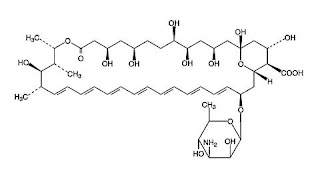Amphotericin B or Abelcet, is a medical drug used in the treatment in several serious fungal infections. Those who do not respond to regular amphotericin treatment, or do not tolerate it, are often prescribed this medication. This medication works to cure fungal infections by stopping fungi growth. Learning about the possible side effects, contraindications, and drug interactions is essential for your safety.
Abelcet Side Effects
Side effects are possible with this medication. Within one to two hours after infusion begins, the following side effects can occur:
Fever, flushing, dizziness, vomiting, shortness of breath, chills, loss of appetite, nausea, headache, and rapid breathing. Other medications can sometimes be used to help alleviate these side effects, but they can cause their own side effects.
The above side effects are common, but if they do not go away or become worse, contact your doctor and let him or her know.
Serious side effects are also possible. All of these side effects warrant a call to your doctor, and in some cases, a trip to the emergency room. These side effects include injection site pain and swelling, muscle or joint pain, weakness, urine output changes, numbness and tingling in legs, numbness and tingling in arms, hearing changes (for example, ringing in the ears), chest pain, unusual tiredness, muscle cramping, painful urination and vision changes.
The rare side effects always require immediate medical attention. These include dark urine, jaundice, heartbeat fast/irregular/slow, blue lips, signs of infection, seizures, coffee ground-looking vomit, severe abdominal pain, feet and ankle swelling, cold sweats, bruising or bleeding easily, mental changes, mood changes, and black stools.
Abelcet Contraindications
You often cannot take this medication if you have certain medical conditions. Also, if you are breastfeeding, or pregnant, avoid this medication. Conditions include certain allergies, white blood cell transfusions,
congestive heart failure, kidney disease, heart disease, liver disease, and irregular heartbeat.
Abelcet Drug Interactions
If you take certain medications, Abelcet may not be for you. These medications include cidofovir, anti-cancer drugs, azole antifungals, digoxin, kidney-affecting medications, potassium-lowering drugs, muscle relaxers, flucytosine, and zidovudine.
Abelcet Risks and Precautions
As you are being treated with this medication, you will have to see your doctor periodically to check for side effects and monitor your progress. During this periodic checkup, you will have a physical and laboratory work done, such as checking the levels of magnesium and potassium in the blood, liver and kidney function testing, and complete blood counts.


No comments:
Post a Comment